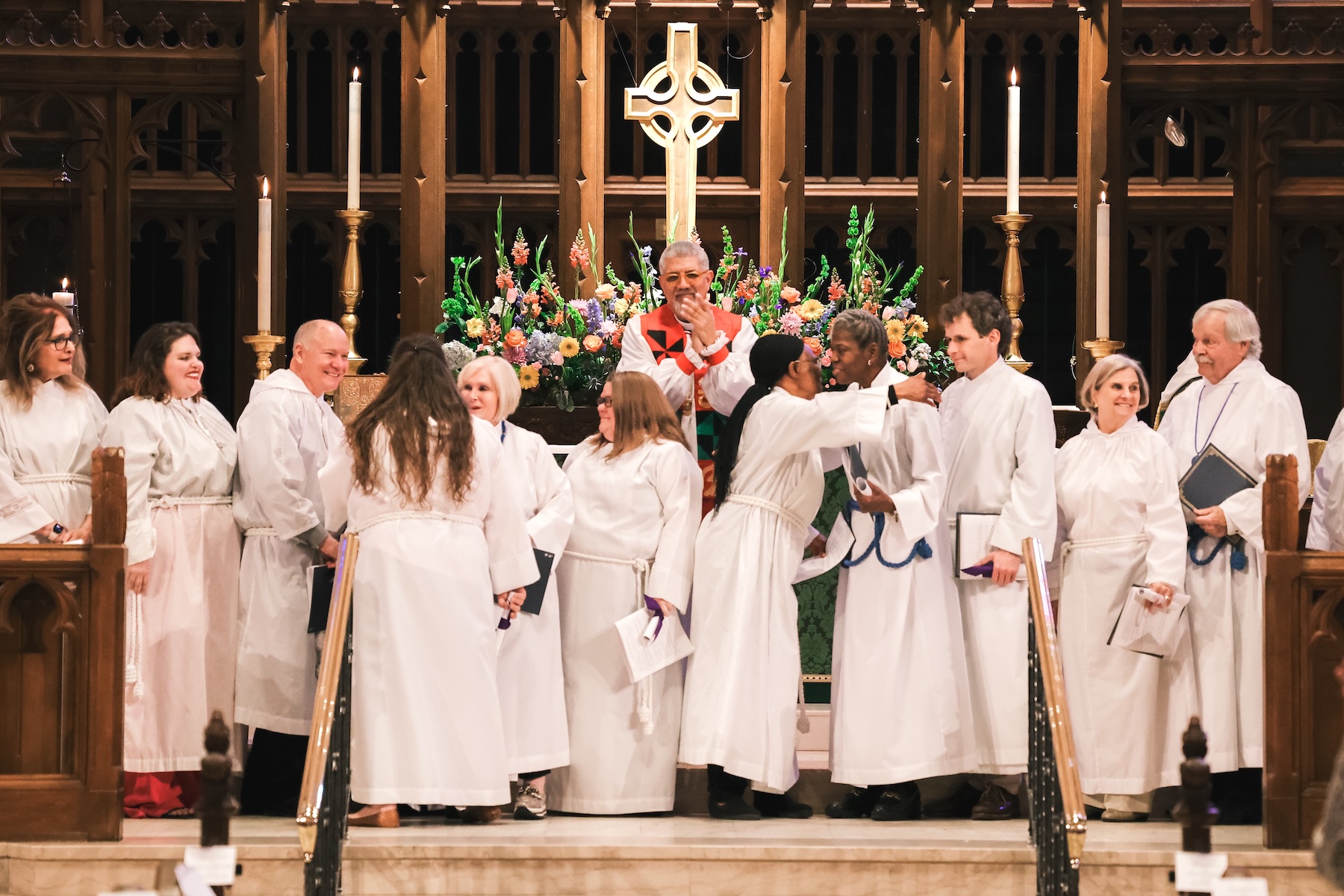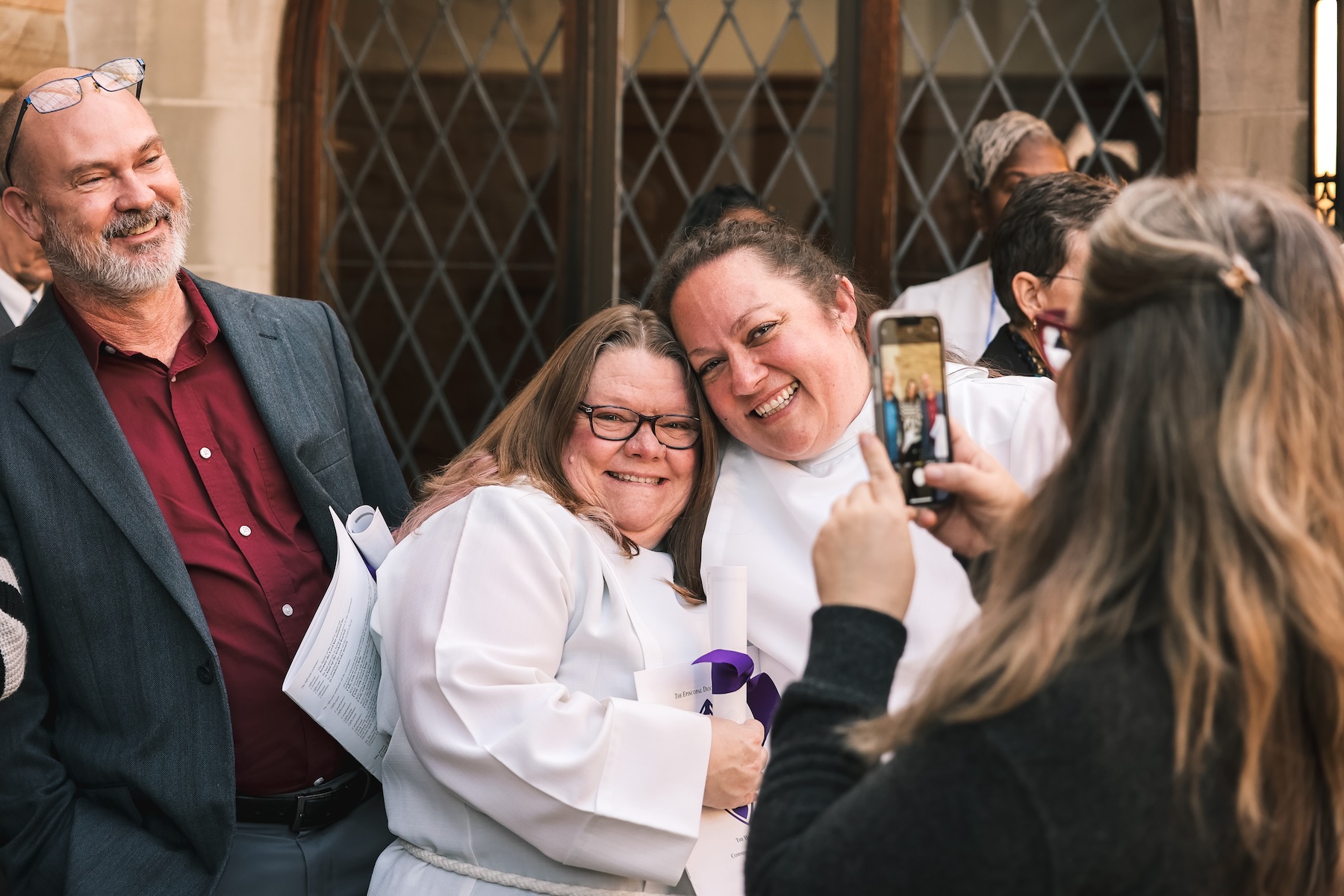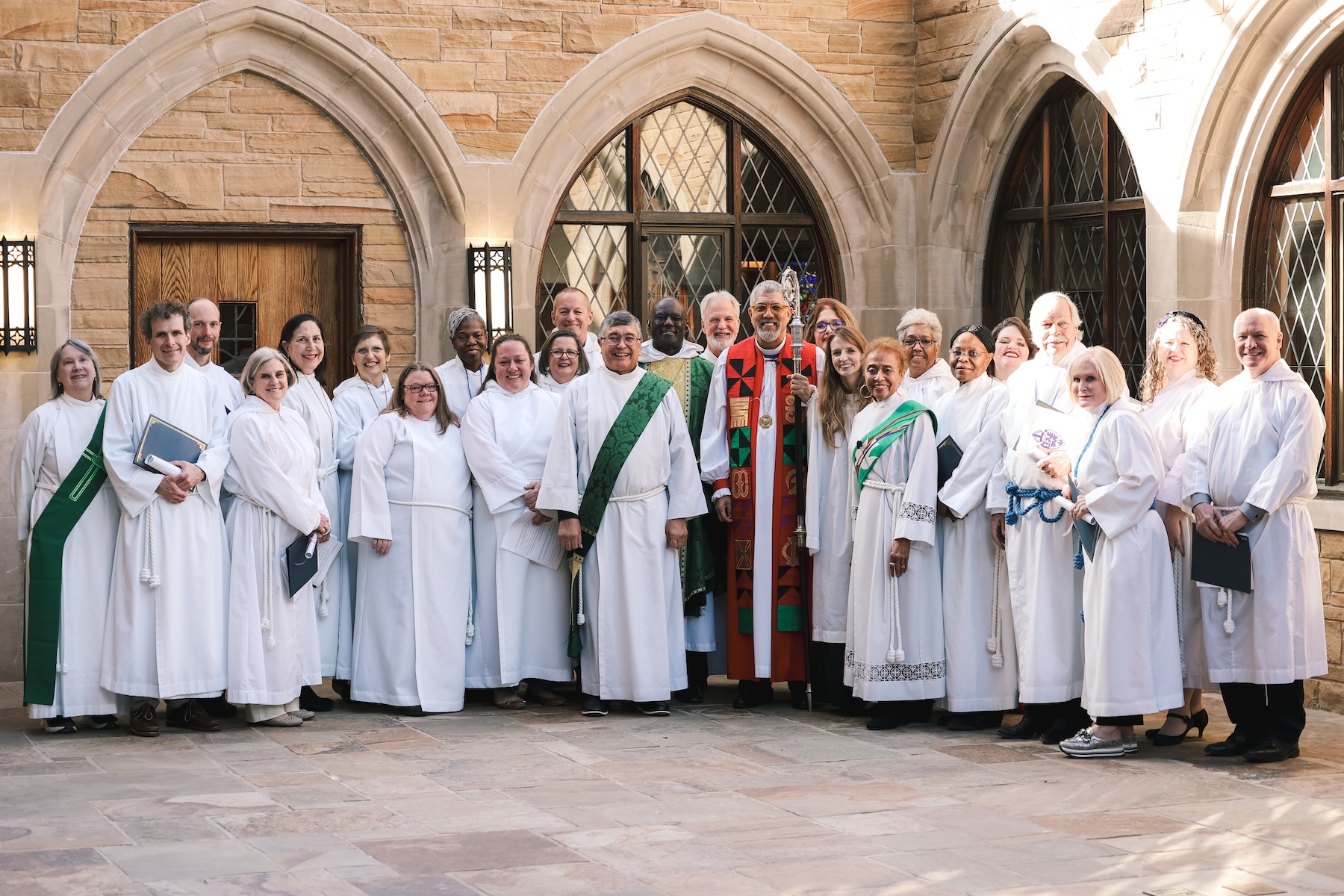By Michelle Hiskey

Episcopalians promise to “serve Christ in all persons” as part of the baptismal covenant. After special training for their own ministries, 19 people recently were commissioned at the Cathedral of St. Philip as licensed lay ministers (LLMs) — a designation that permits people who are not clergy to provide pastoral care, sermons, Eucharist and more.
LLMs are growing in numbers in The Episcopal Diocese of Atlanta. They expand support to their congregations and ministries, bring new skills to church leadership, deepen their own faith and sub for clergy. For many who are called, the licensing is a significant step of faith.
“You don’t not have to be licensed to give care, but gaining more knowledge of pastoral caregiving gives me more confidence,” said Man Martin of St. Martin in the Fields, one of the new LLMs. “It’s a lot of responsibility, and the next natural step in my spiritual growth. All this cohort will tell you the same thing.”
The 19 follow the footsteps of the prophet Isaiah, who responded to a divine vision by saying, “Here I am; send me.” Those five words define humility that is essential to ministry, said Bishop Robert Wright in his sermon at the Jan. 25 commissioning.
“Humility comes when you know that God sees you and has seen you, the wonder of you, the warts of you, your courage, your contradictions,” he said. “Humility is not performance. Humility is not nice. Humility is not the church smile; you know the church smile. It’s not always using the right words, and humility is not the religious version of poor self-worth.
“Humility is a direct response to the majesty of God. Humility remembers that we are dust, and to dust shall we return. Humility doesn’t waste time because it knows that time is God’s greatest gift. Humility is being certain that you are made in the image of God. So are the ones who struggle to love and understand. Humility remembers you have gifts, but so do your brothers and sisters. Humility does ministry with the unfinished.”
Boy howdy, with God’s help
Like clergy, licensed lay ministers must go through discernment and formation. They are supported by a faith community and meet with the Commission on Ministry before commissioning.
The licensing training is conducted through the Formation for All the Baptized (FAB) School of Ministry in the Diocese of Atlanta, which started in 2022. The inaugural group of 15 licensed lay ministers were commissioned in 2023, and another 17 in 2024.
The FAB School for Ministry provides some formation through its own online learning platform, while partnering with Community of Hope International (COHI) for pastoral care training for all LLMs and with Bexley Seabury Seminary for training in particular licensure areas.
The Benedictine-inspired COHI training defines pastoral care as “being ‘present’ in a listening, compassionate, non-controlling manner to an individual or group for the purpose of consciously or unconsciously representing God to them and seeking to respond to their spiritual needs.”

That deep, unconditional communication invigorated Diane Lynch, a new licensee from Christ Church Norcross whose day job is American Sign Language interpreting.
“I personally need to draw near to God in order for God to lead me, and I think that is a constant in our faith,” she said. “Our church has grown and evolved by drawing near to God. That’s how we grow, how we evolve, how we have unity with each other.”
For Diane Hodgins of St. Clements Canton, becoming a licensed lay worship leader and lay preacher was a calling that she has resisted.
“I didn’t know what I was getting into,” she said at the commissioning. “My priest encouraged me to do this. I fought the entire way. I felt I was not worthy.”
Then she saw that with licensing as a lay preacher and worship leader, she could be part of delivering what her community needs.
“It is predominantly older people around us, so we took a service into the retirement community,” she said. “We only have one priest, so we need more preaching and worship leading. Boy howdy, I’m doing things I could only do with God’s help.”
Called to special ministries
So many people were commissioned in various roles that at one point in the liturgy, the bishop said “whew!” He joked that while “Isaiah had hot coals touched to his lips at his commissioning service, don’t worry, we’re going to skip that part of the service today.”
Most of the 19 licensees received more than one designation: 14 are pastoral caregivers, six are pastoral leaders, six are Eucharistic ministers and Eucharistic visitors, four are now preachers, three are worship leaders, two are evangelists and two are catechists.
The new LLMs include:
- Brenda Brunston (St. Mary & St. Martha, Buford)
- Amber Cotton (St. Margaret’s, Carrollton)
- Valerie Curry (St. Edward’s, Lawrenceville)
- Anita Hilburn (St. Aidan’s, Milton)
- Diane Hodgins (St. Clement’s, Canton)
- Tim Hoskins (Christ Church, Macon)
- Marshall Jenkins (St. Peter’s, Rome)
- Diane Lynch (Christ Church, Norcross)
- Man Martin (St. Martin in the Fields, Atlanta)
- Will McDavid (Christ Church, Macon)
- Cecilia Midzi (St. Edward’s, Lawrenceville)
- Diane Nivens (St. Margaret’s, Carrollton)
- Emily Pucker (St. Stephen’s, Milledgeville)
- Lutricia Richardson (Christ Church, Macon)
- Sarah Roberts (St. Mary & St. Martha, Buford)
- Nancy Runion (St. Martin in the Fields, Atlanta)
- Rick Sneddon (Trinity, Columbus)
- Katy Tosh (Christ Church, Macon)
- Virgil Warren (Christ Church, Macon)

Bishop Wright gave the 19 new LLMs a mandate: “One Bible study at a time, one pastoral visit at a time, one outreach adventure at a time, so that everything starts to bend toward the love that Jesus has shared with us and this world and those we hate. So welcome, beloved, to the beautiful struggle.”
Then they were sent forth with the single word that God said to Isaiah:
“Go!”
For information on becoming a licensed lay minister, contact Sally Ulrey, Canon for Congregational Vitality & Ministry Development, Sulrey@episcopalatlanta.org
